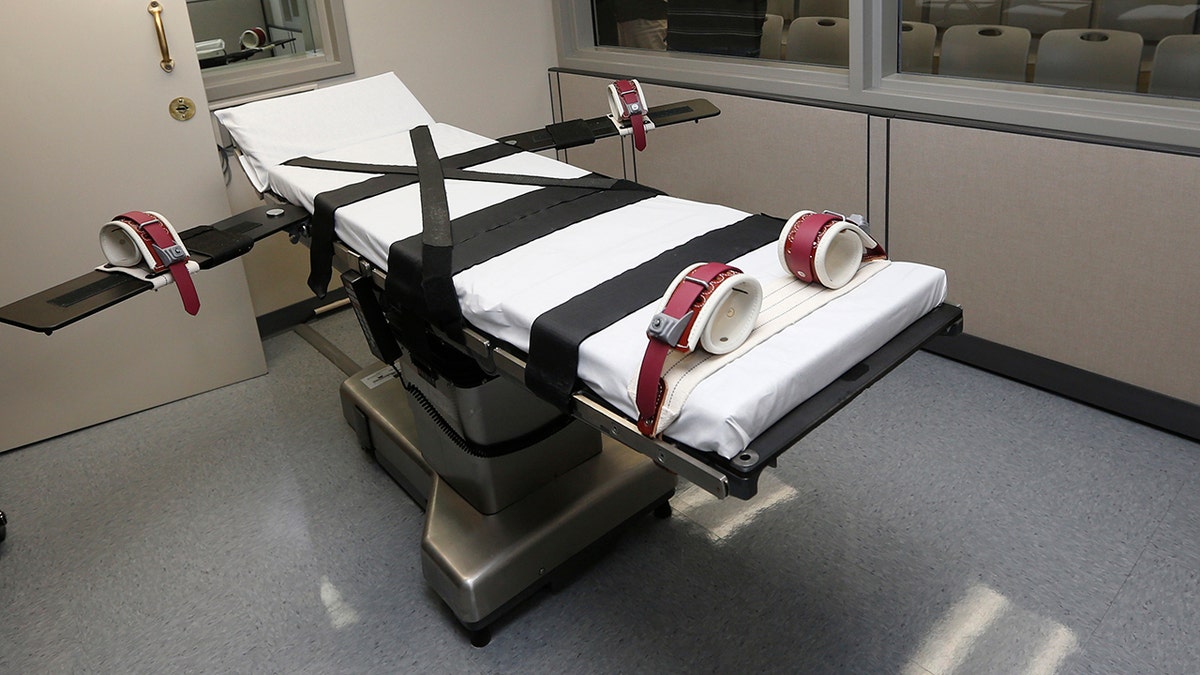Mississippi
Study Shows 1,100% Spike In Mississippi Babies Born With Syphilis—It’s Also Rising In These Other States

Topline
The state of Mississippi saw cases of congenital syphilis rise 11-fold between 2016 and 2022, a new study by University of Mississippi Medical Center researchers shows, contributing to an already high rate of infant illness and death in the state amid a dire rise in cases of the deadly disease that has echoed across the nation in recent years.
The University of Mississippi Medical Center.
Key Facts
The study out Wednesday says 367 infants in Mississippi—the poorest state in America—were hospitalized with undiagnosed congenital syphilis in the seven-year period studied, 92.6% of which were covered by Medicaid, 58% of which were from rural counties and 25% of which were born to mothers with a substance use disorder.
Researchers said the dramatic increase in the condition highlights the link between health, poverty and institutional racism in “fueling transmission of severe but preventable infections.”
More than 70% of the babies hospitalized with congenital syphilis were African-American, though the number of white babies born with the disease increased 2,600% in the time studied, compared to a 1,029% increase among Black children.
Babies born with syphilis—which is passed on from the mother but completely preventable if she receives treatment early—were also more likely to be born prematurely or have very low birthweight, the study showed, and six of the babies diagnosed in the last four years of the study died from the condition.
Pockets of Ohio, Missouri and Minnesota have also seen a rise in congenital syphilis—Missouri last year reported the highest number of cases since 1994, cases in Minnesota increased 42% in 2022 and cases in Ohio rose 158% from 2019 to 2021.
Cases in Arizona, New Mexico, Louisiana and Texas have also risen, CNN reported, with cases in the South growing 432% between 2016 and 2021.
Big Number
324. That’s how many congenital syphilis cases were reported to the Centers for Disease Control and Prevention in 2012. By 2021, that number had risen to 2,677.
Key Background
Every case of congenital syphilis represents “multiple failures of the health system,” Dr. Ali Khan, dean of the College of Public Health at the University of Nebraska Medical Center, told CNN in March, and researchers have blamed a lack of funding for the prevention of sexually transmitted diseases, a shortage of qualified personnel in public health programs and sporadic health coverage for the rise in rates. Syphilis is a disease that can cause sores, rashes and damage to the brain, nerves, eyes or heart if left untreated. It’s usually transmitted through sexual contact and is almost always curable with penicillin. Syphilis can spread from a mother with the condition to her unborn baby, but treatment in the last 30 days before birth can usually stop transmission. Medicaid requires that all pregnant women be tested for syphilis in their first trimester, but testing later in pregnancy or at birth is largely left up to states, with varying policies. States that don’t allow childless adults who are not disabled to be covered by Medicaid—the male partner of a pregnant woman, for instance—have seen the biggest increases in congenital syphilis, per CNN. Wednesday’s study showed that a diagnosis of congenital syphilis increases the mean hospital stay of a newborn to 14.5 days from a standard 3.8-day stay, and hospital charges rise from a mean of $14,945 to $56,802. Between 2016 and 2022, medical costs in Mississippi for congenital syphilis were $20.8 million—$19.4 million of which was paid for by Medicaid.
Tangent
African-Americans have long been disproportionately affected by syphilis, the CDC says, and as of 2018, 35% of reported syphilis cases were among Black people and the rate of congenital syphilis cases that same year was 6.4 times higher for Black people than white. The connection between race and the disease was exploited by the U.S. government for 40 years when the CDC and United States Public Health Service conducted the Tuskegee Syphilis Study on nearly 400 Black men. Researchers told participants they would be treated for their illness but they instead observed the effects of the disease when left untreated and provided the men with placebos and other ineffective methods. The study ended in 1972 and then-President Bill Clinton in 1997 issued a formal apology on behalf of the nation. Victims of the Tuskegee study were given the equivalent of $68 million today following a 1974 lawsuit by the NAACP.
Further Reading
Syphilis Is Rising—And May Not Be Recognized (Forbes)
Penicillin Shortage Explained: Increased Syphilis Rates And Amoxicillin Shortage Fueled Crisis (Forbes)
Syphilis Cases In Women And Congenital Syphilis Skyrocket In Houston: Symptoms And How To Stay Safe (Forbes)

Mississippi
Southeast Mississippi Christmas Parades 2024 | WKRG.com

MISSISSIPPI (WKRG) — It’s beginning to look a lot like Christmas on the Gulf Coast and that means Santa Claus will be heading to town for multiple parades around the area.
WKRG has compiled a list of Christmas parades coming to Southeast Mississippi.
Christmas on the Water — Biloxi
- Dec. 7
- 6 p.m.
- Begins at Biloxi Lighthouse and will go past the Golden Nugget
Lucedale Christmas Parade
Mississippi
‘A Magical Mississippi Christmas’ lights up the Mississippi Aquarium

GULFPORT, Miss. (WLOX) – The Mississippi Aquarium in Gulfport is spreading holiday cheer with a new event, ‘’A Magical Mississippi Christmas.’
The aquarium held a preview Tuesday night.
‘A Magical Mississippi Christmas’ includes a special dolphin presentation, diving elves, and photos with Santa.
The event also includes “A Penguin’s Christmas Wish,” which is a projection map show that follows a penguin through Christmas adventures across Mississippi.
“It’s a really fun event and it’s the first time we really opened up the aquarium at night for the general public, so it’s a chance to come in and see what it’s like in the evening because it’s really spectacular and really beautiful,” said Kurt Allen, Mississippi Aquarium President and CEO.
‘A Magical Mississippi Christmas’ runs from November 29 to December 31.
It will not be open on December 11th, December 24th, and December 25th.
Tickets can be purchased online or at the gate.
The event is made possible by the city of Gulfport and Coca-Cola Bottling Company.
See a spelling or grammar error in this story? Report it to our team HERE.
Copyright 2024 WLOX. All rights reserved.
Mississippi
Mississippi asks for execution date of man convicted in 1993 killing, lawyers plan to appeal case to SCOTUS

Mississippi Attorney General Lynn Fitch, a Republican, is seeking an execution date for a convicted killer who has been on death row for 30 years, but his lawyer argues that the request is premature since the man plans to appeal to the U.S. Supreme Court.
Charles Ray Crawford, 58, was sentenced to death in connection with the 1993 kidnapping and killing of 20-year-old community college student Kristy Ray, according to The Associated Press.
During his 1994 trial, jurors pointed to a past rape conviction as an aggravating circumstance when they issued Crawford’s sentence, but his attorneys said Monday that they are appealing that conviction to the Supreme Court after a lower court ruled against them last week.
Crawford was arrested the day after Ray was kidnapped from her parents’ home and stabbed to death in Tippah County. Crawford told officers he had blacked out and did not remember killing her.
TEXAS LAWMAKER PROPOSES BILL TO ABOLISH DEATH PENALTY IN LONE STAR STATE: ‘I THINK SENTIMENT IS CHANGING’
Mississippi death row inmate Charles Ray Crawford, who was convicted and sentenced to death in 1994 in the 1993 kidnapping and killing of a community college student, 20-year-old Kristy Ray. (Mississippi Department of Corrections via AP)
He was arrested just days before his scheduled trial on a charge of assaulting another woman by hitting her over the head with a hammer.
The trial for the assault charge was delayed several months before he was convicted. In a separate trial, Crawford was found guilty in the rape of a 17-year-old girl who was friends with the victim of the hammer attack. The victims were at the same place during the attacks.
Crawford said he also blacked out during those incidents and did not remember committing the hammer assault or the rape.
During the sentencing portion of Crawford’s capital murder trial in Ray’s death, jurors found the rape conviction to be an “aggravating circumstance” and gave him the death sentence, according to court records.
PRO-TRUMP PRISON WARDEN ASKS BIDEN TO COMMUTE ALL DEATH SENTENCES BEFORE LEAVING

During the sentencing portion of Crawford’s capital murder trial, jurors found his prior rape conviction to be an “aggravating circumstance” and gave him the death sentence. (iStock)
In his latest federal appeal of the rape case, Crawford claimed his previous lawyers provided unconstitutionally ineffective assistance for an insanity defense. He received a mental evaluation at the state hospital, but the trial judge repeatedly refused to allow a psychiatrist or other mental health professional outside the state’s expert to help in Crawford’s defense, court records show.
On Friday, a majority of the 5th U.S. Circuit Court of Appeals rejected Crawford’s appeal.
But the dissenting judges wrote that he received an “inadequately prepared and presented insanity defense” and that “it took years for a qualified physician to conduct a full evaluation of Crawford.” The dissenting judges quoted Dr. Siddhartha Nadkarni, a neurologist who examined Crawford.
“Charles was laboring under such a defect of reason from his seizure disorder that he did not understand the nature and quality of his acts at the time of the crime,” Nadkarni wrote. “He is a severely brain-injured man (corroborated both by history and his neurological examination) who was essentially not present in any useful sense due to epileptic fits at the time of the crime.”

Photo shows the gurney of an execution chamber. (AP Photo/Sue Ogrocki, File)
CLICK HERE TO GET THE FOX NEWS APP
Crawford’s case has already been appealed multiple times using various arguments, which is common in death penalty cases.
Hours after the federal appeals court denied Crawford’s latest appeal, Fitch filed documents urging the state Supreme Court to set a date for Crawford’s execution by lethal injection, claiming that “he has exhausted all state and federal remedies.”
However, the attorneys representing Crawford in the Mississippi Office of Post-Conviction Counsel filed documents on Monday stating that they plan to ask the U.S. Supreme Court to overturn the appeals court’s ruling.
The Associated Press contributed to this report.
-

 Science1 week ago
Science1 week agoTrump nominates Dr. Oz to head Medicare and Medicaid and help take on 'illness industrial complex'
-

 Politics1 week ago
Politics1 week agoTrump taps FCC member Brendan Carr to lead agency: 'Warrior for Free Speech'
-
/cdn.vox-cdn.com/uploads/chorus_asset/file/25739950/247386_Elon_Musk_Open_AI_CVirginia.jpg)
/cdn.vox-cdn.com/uploads/chorus_asset/file/25739950/247386_Elon_Musk_Open_AI_CVirginia.jpg) Technology1 week ago
Technology1 week agoInside Elon Musk’s messy breakup with OpenAI
-

 World1 week ago
World1 week agoProtesters in Slovakia rally against Robert Fico’s populist government
-

 Health5 days ago
Health5 days agoHoliday gatherings can lead to stress eating: Try these 5 tips to control it
-

 News1 week ago
News1 week agoThey disagree about a lot, but these singers figure out how to stay in harmony
-

 Health2 days ago
Health2 days agoCheekyMD Offers Needle-Free GLP-1s | Woman's World
-

 News1 week ago
News1 week agoGaetz-gate: Navigating the President-elect's most baffling Cabinet pick



















